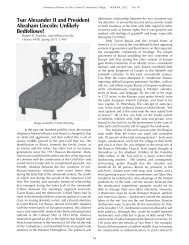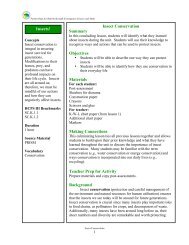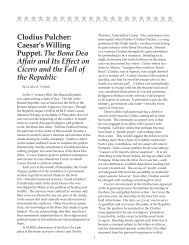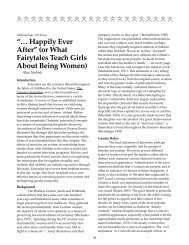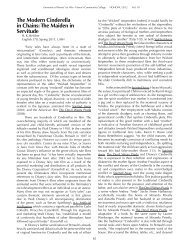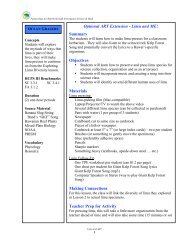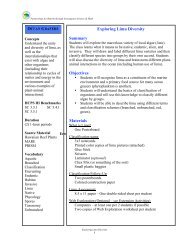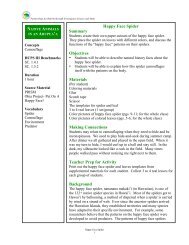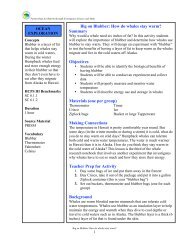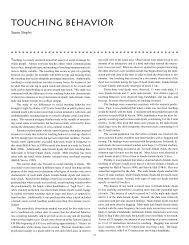A JOURNAL OF ACADEMIC WRITING VOLUME 8
A JOURNAL OF ACADEMIC WRITING VOLUME 8
A JOURNAL OF ACADEMIC WRITING VOLUME 8
You also want an ePaper? Increase the reach of your titles
YUMPU automatically turns print PDFs into web optimized ePapers that Google loves.
that their primary allegiance is to an ideology rather than<br />
a nation. Policy makers should recognize that the combat<br />
situation in Afghanistan is not a war; it is an occupation<br />
designed to root out ideological insurgents in order to<br />
prevent them from launching attacks on the US and further<br />
destabilizing the region. The occupation combines ‘nationbuilding’<br />
development projects and a type of terrorist ‘policing,’<br />
Scholars that argue for an improved system of preventive<br />
detention claim that the criminal justice system is not flexible<br />
enough to detain individuals on the basis of their perceived<br />
threat to the US. They assert that it requires a standard of<br />
admissible evidence higher than the present situation allows (i.e.<br />
evidence collected using questionable interrogation techniques)<br />
(Goldhaber 2009; Wittes et al. 2009). Law Professor David<br />
Cole (in Wittes et al. 2009) counters that preventive detention<br />
is too great a burden on fundamental human rights. He<br />
concedes, however, that detainees deemed too dangerous to<br />
release should be held as POWs but only as long as the war<br />
against the Taliban and al-Qaeda in Afghanistan endures. In<br />
the past, POWs were detained until the two states were no<br />
longer at war, the rationale being that at that point the POWs<br />
would have no reason to fight against the detaining power.<br />
There is little indication that this pattern will hold for those<br />
who fight on behalf of an ideology, and there is some evidence<br />
to suggest that former detainees will resume terrorist activities<br />
(Goldhaber 2009). This suggests that terrorist suspects captured<br />
during an indefinite, ideologically-based conflict should be<br />
detained for criminal trial rather than simply being held until<br />
combat activities cease.<br />
Kenneth Roth (2008), the Executive Director of Human<br />
Rights Watch, is a strong advocate for using the criminal justice<br />
system, which has successfully prosecuted suspected terrorists in<br />
the past. In contrast to President Bush’s military commissions<br />
which convicted two people, 91% of the 160 terrorists tried in<br />
US criminal courts between September 2001 and November<br />
2007 were convicted (Bario 2008; Goldhaber 2009). Moreover,<br />
laws pertaining to conspiracies and the provision of material<br />
support to terrorist organizations are suited to the task of<br />
prosecuting individuals that have planned but not yet carried<br />
out their threat (Roth 2008). David Bario (2008) cites four<br />
cases presented to the courts between 2003 and 2005 where<br />
each of the suspects received sentences equal to or greater<br />
than 20 years despite the fact that they never carried out their<br />
plans. These facts refute two of the major arguments put forth<br />
by opponents that the criminal justice system is structurally<br />
incapable of successfully prosecuting high-level terrorists or<br />
defending the nation from future threats. While the rights of<br />
Guantánamo Bay detainees captured the nation’s attention, the<br />
government amassed a credible record of convicting US citizens<br />
and immigrants charged with terrorism-related crimes abiding<br />
72 - HOHONU Volume 8 2010<br />
by all due process concerns incumbent upon US courts (Bario<br />
2008). It is reasonable to believe that the same record will hold<br />
in the prosecution of suspected terrorists captured on non-US<br />
soil.<br />
Lastly, Roth (2008) points out that criminalizing terrorist<br />
activities eliminates suspects’ ability to portray themselves<br />
as soldiers engaged in a holy war. Publicizing the wanton<br />
murderousness of terrorism not only increases the stigma<br />
associated with their actions, but might also reduce the level<br />
of support their actions receive (Roth 2008) and reduces the<br />
likelihood that others will follow in their criminal footsteps.<br />
For eight years the US government has detained enemy<br />
combatants at Guantánamo Bay in a state of legal limbo. It is<br />
now clear that no US President can attempt to circumvent due<br />
process by detaining terrorist suspects in a location removed<br />
from US territory; Courts have shown their readiness to grant<br />
both statutory and constitutional rights to habeas corpus. A<br />
recurring theme in the literature involves the concern that<br />
the US, in its detention and treatment of Guantánamo Bay<br />
detainees, has compromised its own ideals and made the world<br />
a less safe place; in particular for US soldiers captured abroad<br />
(Fogarty 2005; Ratner 2008; Schneider 2004). Michael D.<br />
Goldhaber (2009) stresses that the Obama Administration<br />
must curtail the perception of detainee mistreatment that<br />
acts as a motivating force in the terrorist ranks. Conducting<br />
open adversarial trials with a full complement of due process<br />
provisions would go a long way towards achieving this.<br />
Evidence suggests that such trials are feasible.<br />
In the first moments of his presidency, “President Obama<br />
rejected as false ‘the choice between our safety and our<br />
ideals’” (Goldhaber 2009). To honor this principle President<br />
Obama must show that he is willing to reconsider some of the<br />
underlying beliefs about what the War on Terror actually are<br />
and adjust policies in detainee treatment. Deconstructing the<br />
popular perception of the war in Afghanistan and exposing it<br />
as an ongoing occupation to combat terrorism and locate those<br />
responsible for insurgent attacks may at first sit uncomfortably<br />
in the American publics’ collective mind. Public support for<br />
the Afghan endeavor is already dropping; removing the label<br />
“war” may facilitate this drop even further. Nonetheless,<br />
President Obama and his detainee review panel must display<br />
honesty and integrity in their assessment of the combat<br />
situation. Terrorist action against the US will likely continue<br />
after the Afghan occupation ends—as will the policing of global<br />
terrorists. It is imperative that the criminal justice system is<br />
prepared to prosecute the cases of suspected terrorists captured<br />
on non-US soil.



